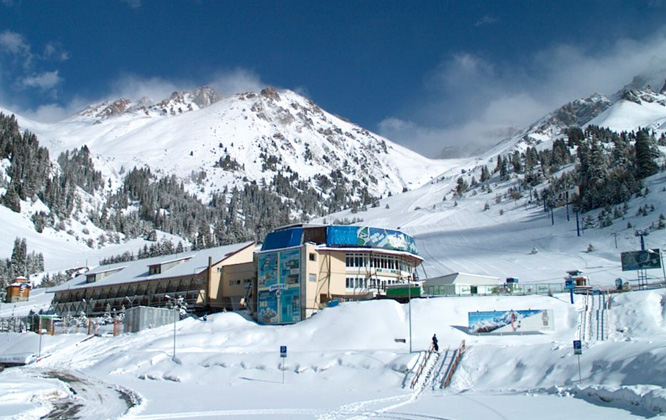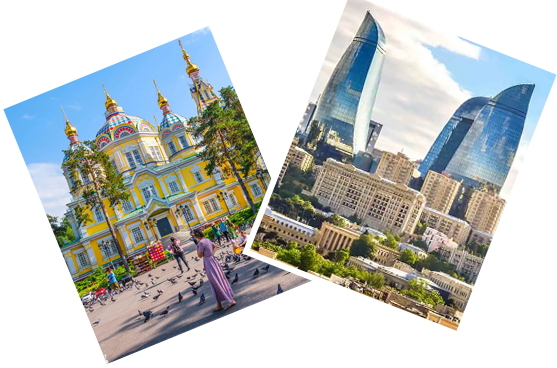
Choose your perfect travel experience
Browse our curated collection of travel destinations worldwide


Discover extraordinary travel experiences and activities

Plan your trip with our customized Balkans tour packages
![]() Hassle-free booking and best price guaranteed
Hassle-free booking and best price guaranteed
![]() 24/7 support available
24/7 support available
![]() Hand-picked tours & activities
Hand-picked tours & activities
![]() Free travel insurance
Free travel insurance
Seek new roads in Balkans with Dook







Balkans: Overview
Balkans or popularly known as Balkan Peninsula as well, comprises of easternmost Europe’s three great southern peninsulas.
All or part of each of those countries - Albania, Bosnia and Herzegovina, Bulgaria Croatia Kosovo, Macedonia, Montenegro, Romania, Serbia and Slovenia, located within the peninsula. Portions of Greece and Turkey are also positioned within the geographic region of the Balkan Peninsula.
Even though historians and geographers’ interpretations differ, the
region is defined culturally, historically and geographically. Moreover,
‘Balkans’ was termed by some with negative nuances connected with the region’s history of ethnic divisiveness and political turmoil.
‘Balkan’ is a Turkish word, which means ‘mountain’ and the peninsula certainly prove it right especially in the west. The Balkan Mountains
lie east-west across Bulgaria, the Mountains extend along the
Greek-Bulgarian border and the Dinaric range extends down the Adriatic
coast to Albania.
In general, the Balkans is bordered on the northwest by Italy, on the
north by Hungary, on the north and northeast by Moldova and Ukraine and
on the south by Greece and Turkey or the Aegean Sea.
Balkans Countries
The Balkan countries are Romania, Slovenia, Croatia, Bosnia and Herzegovina, Serbia, Montenegro, Macedonia, Bulgaria, Albania, and Greece. The European section of Turkey also lies within the Balkan Peninsula.
Albania is located along the Adriatic Sea, Tirane
is its capital. Bosnia and Herzegovina's capital is Sarajevo. Bulgaria
is located along the Black Sea, Sofia is its capital. Croatia has an
hourglass shape squeezed between Slovenia and Bosnia and Herzegovina,
Zagreb is its capital. Greece is on the southwest tip of the Balkan
Peninsula, its capital is Athens. Montenegro is on the Adriatic Sea
north of Albania, with Podgorica as its capital. Romania has the largest
land mass and a western shore on the Black Sea, its capital is
Bucharest. Serbia is landlocked in the center of the peninsula, its
capital is Belgrade. The smaller country of Macedonia is landlocked
south of Serbia, and its capital is Skopje.
A little section of Turkey lies within the Balkan Peninsula, with its
largest city, Istanbul, the only city to overlap Asia and Europe, with
the European side lying on the south-east of the Balkan Peninsula. The
countries on the Balkan Peninsula are frequently known as the Balkan States.
Balkans History
Around 3000 years before, the Greeks are the first known tribes to move south through the Balkans.
In the early Christian centuries, the Goths and Huns and Slavs all
crossed this way, while some settled down. This was the historical area
where tribes confront settled civilizations and clashed as well.
The Balkans is at the heart of a single Greco-Roman
civilization during classical times. But later on they have been in a
distressed crossing point between Roman and Greek Christianity and
between Christianity and Islam. They have been a seismic fault between
Europe and Asia.
While Spain and Italy are apparent geographical regions, defined in the
north by mountain ranges, the third peninsula projecting south into the
Mediterranean is more unstructured.
In the Balkan Peninsula on the west lie the Adriatic
and Ionian seas and the Aegean and the Black Sea on the east while
stretch the open plain at the north. The line of the Danube is termed as
the northern boundary of the region. Through these open plains there
were waves of people entering into Europe from Asia, whether from
Anatolia or along the steppes north of the Black Sea.
Balkans Culture and Tradition
The Balkans constitute group of countries of great diversity but still have admirable cultural heritage in common. With deep History and rich Culture,
Balkans encourages many to travel. Balkan people are more physical and
affectionate; possess a special philosophy of independence, pride,
courage and honour. Due to them, the Balkan region is today known as
typical multi ethnic and multicultural area. Balkans culture is traditionally male-dominated. It is customary for several generations to live together in a compound of houses.
The skilful hands of the Balkan masters have created wonderful pieces of art from wood, stone and metal and the Balkan women wove in the fibres of rugs decked up with decorative elements. The Balkan culinary products collected from the fragrant alpine lawns and century-old forests, offered in some suitable ceramic pots.
Balkan folklore dances are beautiful danced in a line or circle linked
by hand or shoulder hold, without the need of a partner. Gypsy musical
culture has been influenced by exposure to so-called “civilized” West European and American musical cultures.
Balkans Climate and Weather
The mountains play a big role in the region's climate
as well. To the north, the weather is similar to that of central Europe,
with warm summers and cold winters. To the south and along the
coastlines, the climate is more Mediterranean with hot, dry summers and
rainy winters. Balkan has a significant amount of rainfall during the
year.
The driest month is August, with 27 mm of rainfall. With an average of
66 mm, the most precipitation falls in November. The warmest month of
the year is July, with an average temperature of 22.4 °C. January has
the lowest average temperature of 1.2 °C the year.
The difference in precipitation between the driest month and the
wettest month is 39 mm. During the year, the average temperatures vary
by 21.2 °C.
Spring (March through May): Humidity and temperatures combine to make this season feel very cold.
Summer (June through August): The middle-year months have cold weather with high temperatures.
Fall (September through November): It rains or snows a significant amount, 3 to 6 days per month.
Winter (December through February): Weather is far too cold this time of the year.
Balkan Tourism
Where new expansions in European tourism are
concerned, the considerable growth of the Balkans as a destination for
vacations and travel is one of the most noteworthy inclinations in
recent years. With approximately 105 million visitors to the Balkans
each year, the region has become an important tourist destination.
Economically, travel and tourism promote employment, exports,
supplemental foreign currency reserves, advanced technology, enhanced
domestic supply chain, domestic consumption, private capital investment
and public sector expenditures including capital investment for budget
items like museums, national parks and transportation infrastructure.
Evidently, it is natural that more and more people are discovering the
Balkans following centuries of local experience in cultivating the great
traditions of hospitality. It is well known that in ancient times,
travellers from ‘outside world’ who brought news and entertainment were welcomed by their hosts and favoured with preferential food, drink and accommodations.
Balkan Tours and Travels
The overconfident hospitality is what that makes each day unanticipated
spent in the Balkans. This is the region abundant with fresh
adventures, available than ever before. Regarding outdoor tour and holiday activities in Balkan,
there are Rocky Mountains and terracotta towns attractively includes
the Adriatic Sea along the Croatian and Montenegrin shorelines.
Albania is perhaps Europe’s most undiscovered
treasure. Albanian travel in the heart of the Mediterranean, on the
Adriatic and Ionian Seas, offers something increasingly rare, a glance
into a culture heritage. Besides, Albania's and Macedonia's mountain
peaks are there for trekking and cycling and rivers to raft in Bosnia
and Herzegovina, Serbia or Slovenia. Some boat trips in the Balkans can
be enjoyed with picturesque surroundings matchless to any worldwide. Landscapes of Bosnia and Serbia
provide a journey rich in history and tradition. Lying at the
crossroads of eastern and western cultures, they present a mix of
Ottoman influences, Austro-Hungarian history and a warm hospitality that
cannot fail to captivate. Though modification is coming on rapidly,
timeless traditions and cultural custom-made aren't falling by the
wayside. It's a region where one can hardly keep up with the night life,
but still get stuck behind a horse and cart.
Balkans is the hidden jewel of Europe,
yet to be explored by the Indian traveller. Frequent flight
connections, easier visa formalities and friendly prices of the hotels
and sightseeing excursions are some of the reasons for interest from the
Indian travel and holiday package market. In fact Serbia has a facility of Visa on arrival for Indian travellers.
Balkan Tour and Holiday Packages
The exceptional natural, historical, cultural, ethnic, religious,
linguistic, social and political diversity of the Balkans help
converting the region into transnational tourist destination. Travellers
can reach this region with Air India flights into Vienna, Turkish Airlines
offering flight connectivity to Balkan States and excellent
connectivity to Budapest and Greece by major carriers including Turkish
Airlines, Emirates, Qatar and most European Carriers.
Regional Balkan Tour Packages can start and end in all
the neighbouring countries airports like Sarajevo, Athens, Venice,
Skopje, Podgorica, Istanbul, Ljubljana, Budapest, Tivat, Vienna, Tirana,
Timisoara, Sofia, Dubrovnik, Bucharest, Zagreb where guides welcome
groups and take them along the imaginative itineraries.
Balkan Tour Packages are created from experiencing
lifestyle of different cultures and environments, meeting with true
locals and sharing their attitudes, feelings, customs, beliefs, legends,
myths and way of life.
More than 300 inspiring trips with tour packages can be created all through Serbia and the Balkans overall. Balkan Tours
are guided by professional travel guides and travel advisers, while
some groups explore rich cultural heritage of the Balkans, guided by the
Serbian Orthodox monks, art historians, historians and archaeologists.
Balkan heritage trails focused on the local culture,
art, architecture, music, hospitable people of the Balkans, food and
wine and plenty of memorable surprises and excitements one can
experience only in the Balkan countries. Handicraft
workshops, Balkan traditional food and homemade products, touring the
ancient prehistorically, Roman, Byzantine and Ottoman sights and
landmarks of the Balkans, local events and festivals, amaze all. Rural
households featuring traditional lifestyle, icon painting, Cyrillic
calligraphy and woodcarving, music and folklore courses are the rare
experiences one can collect while exploring the Balkans.
Dook International - Leading Balkans Tour Operator
Dook International, one of the Leading Balkan Travel Agency and destination management companies, in India. The organisation specializes in authentic travel programs to the Balkan region including Croatia, Slovenia, Montenegro, Bosnia and Herzegovina, Albania, Serbia and Macedonia.
The timing is perfect to have a reliable company like Dook International to help travel agents and tour operators in India in planning unique itineraries for their end customers who are on the lookout for new destinations. From culinary tours to local music immersions and private tours, Dook International is the ideal partner to introduce the Balkan region.
The services include everything from meet and assist at the airport to
accommodation, transfers, excursions, sightseeing, tour guides. All
operations and land arrangements are handled by well-trained, highly
motivated and personally involved, multilingual and professional staff
with knowledge and understanding of the customers business and market.
Balkans Travel Guide and Tips
Balkans are safe, affordable, interesting, stunning, rich in history
and culture, full of delicious food. Of late low cost airlines (Ryanair, Wizzair, Easyjet) started flying to the Balkans, hence easy to get into the Balkans. The best time to travel the Balkans
is in most cases the spring and summer season. But sometimes it becomes
difficult to get public transport out of the airport. Very often it’s
nonexistent and taxis are overpriced, but the only option. There are
also bus and train connections from neighbouring countries (Austria, Hungary, Greece) but take hours and are expensive Trains operate only very few routes so best option are buses.
Crossing borders during Balkan travels shouldn’t be
too much of a hassle. As the region is becoming more and more popular in
most of the places lots of accommodation options are found. The Balkans
are food heaven for all the meat lovers. Places near the coast are
known for excellent fresh fish and seafood.
Balkans is very safe as the people are super friendly
and helpful. Prices are moderate across the Balkans, far more cheap than
in Western Europe. During off season affordable accommodation and food
are abundant in touristy places.
General views are - Macedonia and Albania to be the cheapest countries while Croatia is
the most expensive one, the rest is simply fine. Expensive is the
transport between the cities. Worth mentioning that Kosovo, Montenegro
and Slovenia use Euro as their currency.
Best Time to Visit Balkans Countries
The Balkan region spreads over 500,000km², so climate does vary, particularly between the mountains and the coast. Many Balkan countries
are small, too, like Montenegro or Macedonia, so they get busy in July
and August. Generally spring and autumn are the perfect time for
cultural and national park visits.
During spring everything is green and blooming and the air smells like
flowers. Early autumn is also best time for one to visit and enjoy in
the Balkans. Basically from end of March till mid June and from
September till late October is the apt and preferable time to travel to the Balkans.
Testimonials
"Our trip with Dook International was just fantastic. We learnt about Vietnam history and culture. We have also tried delicious food of Vietnam and indulge in different adventures…”
Dr.Ramesh Keval chand

Ready to venture out into the world? Fill the form below and start your brand new journey with us

